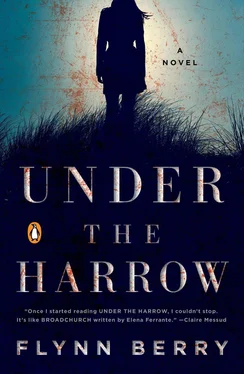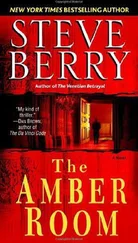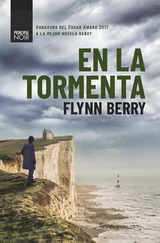“I’m a plumber. If you need help with the house or anything, let me know,” he says. His coat is zipped to his chin, leaving only his hands and head exposed. I check for scratches or bruises, but if he has any they are hidden. “My mum died last year. There’s a lot to sort out, I’m happy to help.”
He walks away. I start toward Marlow, and once he is out of sight, I run.
• • •
My phone doesn’t have service until Cale Street.
“Have you interviewed someone named Denton yet?”
“Yes,” says Moretti, “Keith Denton.” I didn’t think he would tell me. I thought police interviews were confidential, and for a moment I wonder whom he has told about speaking with me.
“He was at Rachel’s house on Friday.”
“I know. One of her neighbors saw his van. We interviewed him at the station on Saturday.”
“Why did you let him go?”
“We don’t have grounds to arrest him. Our technicians are still performing tests on the van. He’s not to leave the area.”
“Did you check him for injuries?” Rachel had defensive wounds, and the dog was trained by a security firm. He would have tried to protect her.
“We haven’t found any evidence to incriminate him. According to him, Rachel was alive and well when he left her house.”
“Where was he between three and four?”
“Resting.”
“Where?”
“In his van at the pond. He was up the night before on a job in Kidlington.”
“Did anyone see him?”
“We’re confirming his movements with witnesses and CCTV.”
He must have something to gain from telling me this. It must be a technique. I wonder if he thinks the information will trigger some memory for me. That Rachel met lovers at the pond, maybe, or that the location has some meaning.
“Was he the person watching her from the ridge?”
“Nora, I don’t know yet. We’ll know more when the results return from the lab.”
• • •
The high street appears almost preternaturally beautiful and civilized, and I am shaky with relief to not be alone with him anymore.
The yellow awning of the Miller’s Arms thumps in the wind. Soft clouds marble the windows of the library. There are a dozen people on the street, and one of them, a woman with dark hair and kaleidoscopic blue eyes, stops in front of me. “Nora. I’m so sorry about your sister.”
“Are you from the hospital?” I ask.
She shakes her head. “Do you want to get a cup of tea?”
She smiles and squeezes my arm, and I have the sense that people here will look out for me. We go to the Miller’s Arms. She sets the tea in front of me and gives me an encouraging smile. The relief of being with another person, in the warmth of company, sinks me into my chair.
I might have just met her murderer. This knowledge roars in my ears. A few minutes, somewhere safe.
I’ve only been to the Miller’s Arms once before. My drink was pale and frothy and it had a violet floating on its surface. This delighted me. “Bloody hell,” said Rachel. Her fish pie arrived with one speckled blue-and-red crab claw pointing from its crust, which mollified her a little. “Does it make up for the violet?” I asked. “No, definitely not.”
“I’m sorry,” I say now. “I don’t remember your name.”
She sets her cup down and the clink of it on the saucer is so domestic, so incongruous.
“Sarah Collier. I work at the Telegraph .”
I notice, with a whip of vertigo, the other people in the room looking at us. I stand and walk out.
Sarah catches me up outside. She left her coat indoors and stands, shivering, in a cream-colored jumper, her hands tucked under her arms. “I’m not going to ask you any questions. I’m just here, if you need to talk.”
“I’m not talking to the press.”
“Did Alistair tell you to say that?” she asks. “You don’t need to listen to everything he says.”
I don’t want Sarah to know where I’m staying, so I walk toward the common. When I look back, the door to the Miller’s Arms is swinging shut behind her. I pass the common and turn down Salt Mill Lane. At the side of the road is a memorial, and my first thought is that it is for Rachel. My hand goes to my mouth. There are candles and piles of pale cut flowers. Then I notice the football jersey pinned to the fence, and a card with the name Callum across it.
The small semidetached house behind the fence looks vacant. Rachel told me he died in September, his family won’t have sold it yet. I wait until the lane is empty, then kneel to read some of the cards. The messages show people gripped by his death, and anguished by it. A lot of them describe him as a hero. Either no one knew what he was like, or they knew and didn’t care.
I AM CROSSING the high street when I see Lewis in the newsagent’s shop, speaking with the old man who owns it. I wait for him to come out.
“Is he a suspect?”
“No.”
From his shop, Giles has an unobstructed view of the train station. He is also the town gossip, according to Rachel. His shop has longer hours than any other business on the high street, and he knows everyone in town. People confide in him. He asks after illnesses, pregnancies, divorces. I remember, absurdly, that he knows about my breakup with Liam. He got it out of me in the two minutes I spent buying a newspaper and bottle of mineral water at his shop in May.
I consider his view, of the hooked lights on the platform and the station house, then follow Lewis up the high street. We find a bench on the common. The priest is in the church graveyard in his black robe. A cedar elm rises above him, sheltering him under its green tier.
“Do Anglican priests hear confession?” I ask.
“No, not formally. Not like Catholic ones. But it wouldn’t be any good if they did, they never tell us anything.”
The priest climbs the church steps. For a moment, he seems to be looking at us, then he grasps the iron rings inside the two doors and pulls them shut.
“Does he have to close the doors like that?” says Lewis. “Can’t he do one, then the other?”
I stare at the stained glass window above the doors. Across the common, wind rushes through the yews, a vast, maritime sound. The wind grows stronger, and it’s like I am on the strand in Edinburgh, near my university.
“A man named Andrew Healy assaulted a teenage girl in Whitley two years ago,” says Lewis. “It’s six miles from Snaith. Rachel wrote him a letter asking to visit him in prison. He agreed, and she visited him in March.”
“Was it him?”
“No. Healy was serving a drugs sentence the summer of Rachel’s assault.”
“Could he have left?”
“It’s a class-A prison. The day of her assault he was on canteen duty. They would have recorded it if he somehow stepped out.”
“Did Rachel know that?”
“Healy says he told her it couldn’t have been him. Rachel spoke to his solicitor, who confirmed the dates of his sentence.”
“Where did she visit him?”
“A prison outside Bristol.” Lewis looks embarrassed for me. She didn’t ask me to come and wait in the car. She didn’t even tell me she’d written him. “Did Rachel ever talk about looking for her attacker?”
“She said she stopped. She said she wanted to forget it ever happened.”
Of course that was what she told me. For years I had urged her to stop looking, and at a certain point it must have been easier to lie than to argue.
“When was this?” asks Lewis.
“Five years ago. Is he a suspect?”
“No. Healy’s still in prison.”
• • •
At the Hunters I find the route from her house to the prison. I imagine Rachel in the visitors’ room as the prisoners start to file in. I don’t know what she planned to say. What abuse she would turn on him.
Читать дальше












